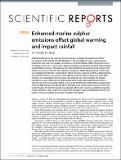Enhanced marine sulphur emissions offset global warming and impact rainfall
Author(s)
Grandey, B. S.; Wang, Chien
DownloadGrandey_Enhanced marine.pdf (1.464Mb)
PUBLISHER_CC
Publisher with Creative Commons License
Creative Commons Attribution
Terms of use
Metadata
Show full item recordAbstract
Artificial fertilisation of the ocean has been proposed as a possible geoengineering method for removing carbon dioxide from the atmosphere. The associated increase in marine primary productivity may lead to an increase in emissions of dimethyl sulphide (DMS), the primary source of sulphate aerosol over remote ocean regions, potentially causing direct and cloud-related indirect aerosol effects on climate. This pathway from ocean fertilisation to aerosol induced cooling of the climate may provide a basis for solar radiation management (SRM) geoengineering. In this study, we investigate the transient climate impacts of two emissions scenarios: an RCP4.5 (Representative Concentration Pathway 4.5) control; and an idealised scenario, based on RCP4.5, in which DMS emissions are substantially enhanced over ocean areas. We use mini-ensembles of a coupled atmosphere-ocean configuration of CESM1(CAM5) (Community Earth System Model version 1, with the Community Atmosphere Model version 5). We find that the cooling effect associated with enhanced DMS emissions beneficially offsets greenhouse gas induced warming across most of the world. However, the rainfall response may adversely affect water resources, potentially impacting human livelihoods. These results demonstrate that changes in marine phytoplankton activity may lead to a mixture of positive and negative impacts on the climate.
Date issued
2015-08Department
Massachusetts Institute of Technology. Center for Global Change ScienceJournal
Scientific Reports
Publisher
Nature Publishing Group
Citation
Grandey, B. S., and C. Wang. “Enhanced Marine Sulphur Emissions Offset Global Warming and Impact Rainfall.” Scientific Reports 5 (August 21, 2015): 13055.
Version: Final published version
ISSN
2045-2322